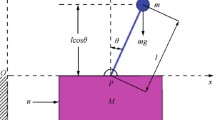Abstract
Modern controller design is increasingly based on data-driven control methods. PID controllers are still used primarily in the industry, because they are Linear Quadratic Regulator (LQR). The LQR provides an efficient way to tune the parameters of a PID controller. The LQR has the disadvantage of requiring accurate models of the system, as well as reducing a high-order system to a second-order model. First, we explore the new horizons of control theory in the form of the state-space model for high nonlinear systems. Second, the Lagrangian method establishes the new mathematical model of the two-stage linear inverted pendulum system. In addition, real-time LQR parameters are calculated under variable load. This method has been demonstrated to be highly applicable and accurate through simulations and experiments using the Double Inverted Pendulum model.
















Similar content being viewed by others
Data availability
The data that support the findings of this study are available from the corresponding author, upon reasonable request.
References
Ahmad S, Ali A (2021) Unified Disturbance-Estimation-Based Control and Equivalence With IMC and PID: Case Study on a DC-DC Boost Converter. IEEE Trans Indus Electro 68(6):5122–5132
Aslam MS (2020) Co-design method for \(H_{\infty }\) control of quantized T-S fuzzy system over the networked system. J Intell Fuzzy Syst 39(1):771–788
Aslam MS, Qaisar I (2023) Sensor networks with distributed event-triggered scheme for T-S fuzzy system with dissipativity analysis. European Journal of Control 71:100800
Aslam MS, Qaisar I, Saleem MA (2020) Quantized Event-triggered feedback control under fuzzy system with time-varying delay and Actuator fault. Nonlinear Analysis: Hybrid Systems 35:100823
Aslam MS, Li Q, Hou J (2021) Fault detection for asynchronous T-S fuzzy networked Markov jump systems with new event-triggered scheme. IET Control Theory Appl 15(11):1461–1473
Aslam MS, Zhenhua M, Ullah R, Li Y, Sheng A, Majid A (2022) Stability and admissibility analysis of T-S descriptive systems and its applications. Soft Computing 26(15):7159–7166
Baciu A, Lazar C, Caruntu CF (2021) Iterative Feedback Tuning of Model–Free Controllers, \(25^{th}\) International Conference on System Theory, Control and Computing (ICSTCC), pp: 467–472 https://doi.org/10.1109/ICSTCC52150.2021.9607213
Bilal H, Yin B, Aslam MS, Anjum Z, Rohra A, Wang Y (2023) A practical study of active disturbance rejection control for rotary flexible joint robot manipulator. Soft Computing 17:1–5
Bilal H, Yin B, Kumar A, Ali M, Zhang J, Yao J (2023) Jerk-bounded trajectory planning for rotary flexible joint manipulator: an experimental approach. Soft Computing 27(7):4029–4039
da Silva RWP, Eckhard D (2019) Extension of the Correlation–based Tuning Method for Load Disturbance Rejection, IEEE \(58^{th}\) Conference on Decision and Control (CDC), pp: 8386–8391 https://doi.org/10.1109/CDC40024.2019.9029360
Joglekar A, Krovi V, Brudnak M, Smereka JM (2022) Hybrid Reinforcement Learning based controller for autonomous navigation, IEEE \(95^{th}\) Vehicular Technology Conference: (VTC2022-Spring), pp: 1–6, https://doi.org/10.1109/VTC2022-Spring54318.2022.9861014
Kozáková A, Veselý V, Kučera V (2019) Robust decentralized controller design based on equivalent subsystems, Automatica, vol. 107, pp: 29–35
Srivastava S, Misra A, Thakur S, Pandit V (2016) An optimal PID controller via LQR for standard second order plus time delay systems. ISA Trans 60:244–253
Sun H, Liu Y, Li F, Niu X (2019) Distributed LQR Optimal Protocol for Leader-Following Consensus. IEEE Trans Cybern 49(9):3532–3546
Vlahakis EE, Dritsas LD, Halikias GD (2019) Distributed LQR design for identical dynamically coupled systems: Application to load frequency control of multi–area power grid, 2019 IEEE \(58^{th}\) Conference on Decision and Control (CDC), https://doi.org/10.1109/CDC40024.2019.9028865, pp: 4471–4476
Ziegler JG, Nichols NB (1942) Optimum settings for automatic controllers. Trans ASME 64:759–768
Funding
This work was supported by the Big Data Analytic Center of United Arab Emirates University under grant code 12R135.
Author information
Authors and Affiliations
Corresponding author
Ethics declarations
Conflict of Interest
No conflict of interest has been declared by the authors.
Additional information
Publisher's Note
Springer Nature remains neutral with regard to jurisdictional claims in published maps and institutional affiliations.
Rights and permissions
Springer Nature or its licensor (e.g. a society or other partner) holds exclusive rights to this article under a publishing agreement with the author(s) or other rightsholder(s); author self-archiving of the accepted manuscript version of this article is solely governed by the terms of such publishing agreement and applicable law.
About this article
Cite this article
Aslam, M.S., Bilal, H. & Hayajneh, M. Lqr-based PID controller with variable load tuned with data-driven methods for double inverted pendulum. Soft Comput 28, 325–338 (2024). https://doi.org/10.1007/s00500-023-09442-9
Accepted:
Published:
Issue Date:
DOI: https://doi.org/10.1007/s00500-023-09442-9



